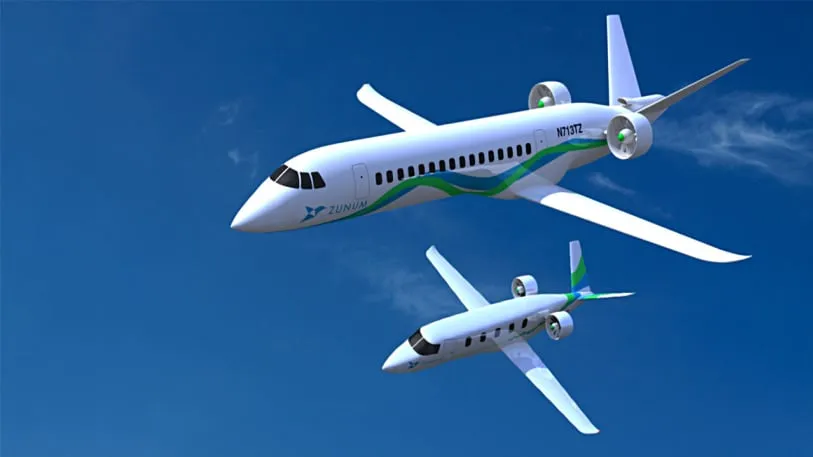
Boeing invests in better battery power
Jan 30, 2018

Boeing is making significant investments in advanced battery technology to enhance the efficiency and sustainability of its aircraft. Recognizing the growing demand for greener aviation solutions, the company aims to develop lighter, more powerful batteries that can improve performance and reduce emissions. This initiative is part of Boeing's broader commitment to innovation and environmental responsibility, as it seeks to address the challenges of climate change within the aerospace industry. By focusing on better battery power, Boeing hopes to not only enhance the operational capabilities of its aircraft but also to lead the way in the transition to cleaner energy sources in aviation.
Boeing, a leader in aerospace innovation, has recently made significant investments in advanced battery technology to enhance the performance and sustainability of its aircraft. This strategic move aims to meet the growing demand for more efficient and environmentally friendly aviation solutions. As the industry shifts towards electric and hybrid propulsion systems, Boeing's focus on better battery power is crucial for maintaining its competitive edge.
The Importance of Battery Technology in Aviation
Battery technology plays a pivotal role in the future of aviation. With the increasing emphasis on reducing carbon footprints and improving fuel efficiency, the development of high-capacity batteries is essential. Boeing’s investment in better battery power aligns with global initiatives to achieve net-zero emissions in the aviation sector by 2050.
Efficient battery systems can lead to:
- Reduced operational costs
- Lower emissions
- Enhanced flight range and performance
Current Innovations in Battery Power
Boeing has been exploring various battery technologies, including lithium-sulfur and solid-state batteries. These innovations promise greater energy densities, which can significantly improve the performance of electric aircraft. The following table summarizes the key features of these advanced batteries:
| Battery Type | Energy Density (Wh/kg) | Advantages | Challenges |
|---|---|---|---|
| Lithium-Sulfur | 500-600 | High energy density, lower cost materials | Cycle life and stability issues |
| Solid-State | 300-900 | Improved safety, higher energy density | Manufacturing complexities |
Strategic Partnerships and Collaborations
To accelerate the development of better battery power, Boeing has established strategic partnerships with leading technology firms and research institutions. Collaborations with companies specializing in battery research and development enable Boeing to leverage cutting-edge innovations and expedite the commercialization of advanced battery technologies.
These partnerships not only enhance Boeing's technological capabilities but also foster innovation across the aviation sector. By working together with industry experts, Boeing can tackle the challenges associated with battery technology more effectively.
Environmental Impact and Sustainability Goals
Boeing’s commitment to sustainability is evident in its investment in better battery power. As part of its broader environmental initiatives, the company aims to reduce greenhouse gas emissions and promote cleaner air travel. The aviation industry is responsible for a significant portion of global emissions, making the transition to electric and hybrid aircraft imperative.
By enhancing battery technology, Boeing seeks to:
- Minimize reliance on fossil fuels
- Reduce noise pollution
- Promote the use of renewable energy sources in aviation
The Future of Electric Aircraft
As battery technology continues to evolve, the future of electric aircraft looks promising. Boeing's investment in better battery power is a crucial step towards realizing the potential of electric and hybrid aircraft, which are expected to play a significant role in the future of aviation. These aircraft will not only be more efficient but also contribute to a more sustainable aviation ecosystem.
With advancements in battery technology, electric aircraft are anticipated to offer:
- Longer flight ranges
- Faster charging times
- Lower overall maintenance costs
Conclusion
Boeing's focused investment in better battery power is a testament to its commitment to innovation and sustainability in the aviation sector. By advancing battery technology, Boeing is positioning itself as a leader in the transition to cleaner, more efficient air travel. The collaboration with industry partners and research institutions will be pivotal in overcoming the challenges associated with battery development and paving the way for the future of electric aviation.
As the aviation industry continues to evolve, Boeing’s efforts in improving battery technology will not only help the company achieve its sustainability goals but also inspire others in the industry to follow suit. The advancements in battery power are set to revolutionize air travel, making it more efficient, environmentally friendly, and accessible for future generations.
Related Articles

Explore Thailand: The Best Islands to Visit for Paradise, Adventure, and Relaxation

The Ultimate Guide to the Best Islands in Thailand for Your Next Getaway

Do babies need passports? How to get a passport for a newborn

How to get a U.S. passport fast: here’s how to expedite the process

What is Mobile Passport Control: 5 reasons why you should use it

SENTRI vs. Global Entry: A detailed guide

Do you need a passport to go to the Bahamas? Let’s find out

Do you need a passport to go to Mexico? A detailed guide

Do you need a passport to go to Canada? We got the answer

Do You Need a Passport for a Cruise: An Essential Travel Guide

Booster Seat Requirements: All the Rules to Follow in Your Rental Car

What Are the World’s Most Powerful Passports, and How Does Yours Rank?

How to Take a Passport Photo at Home: A Helpful Guide

You've got to have heart! Southwest's new livery

Your opinion: Should water be free on low cost carriers?

Young women bolder than guys as solo travellers
